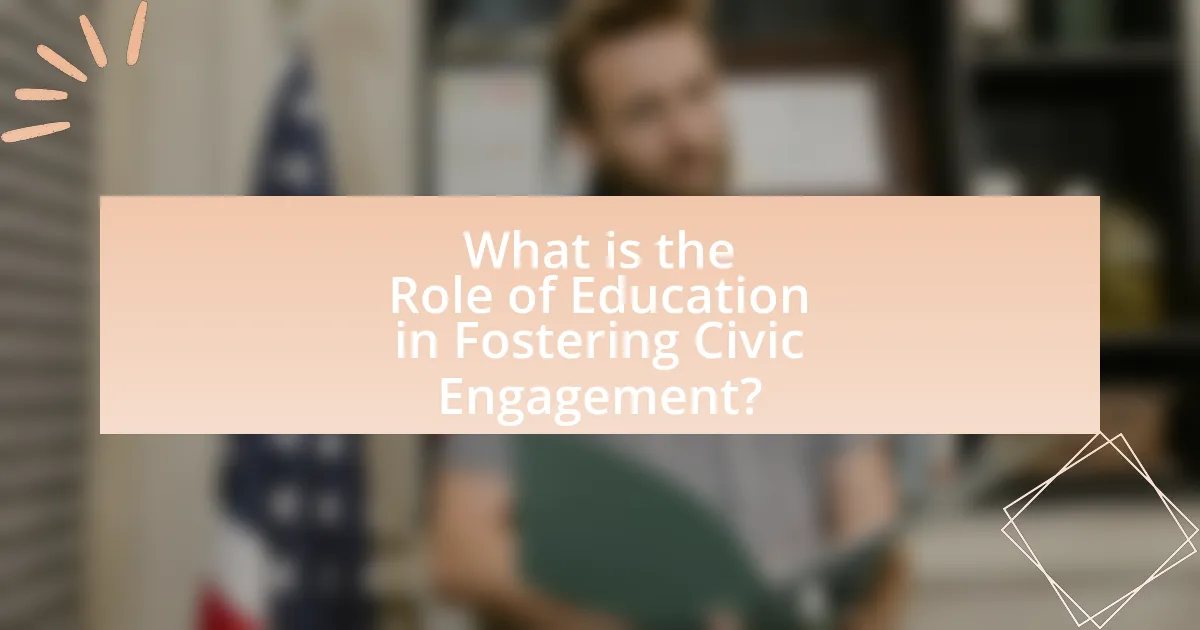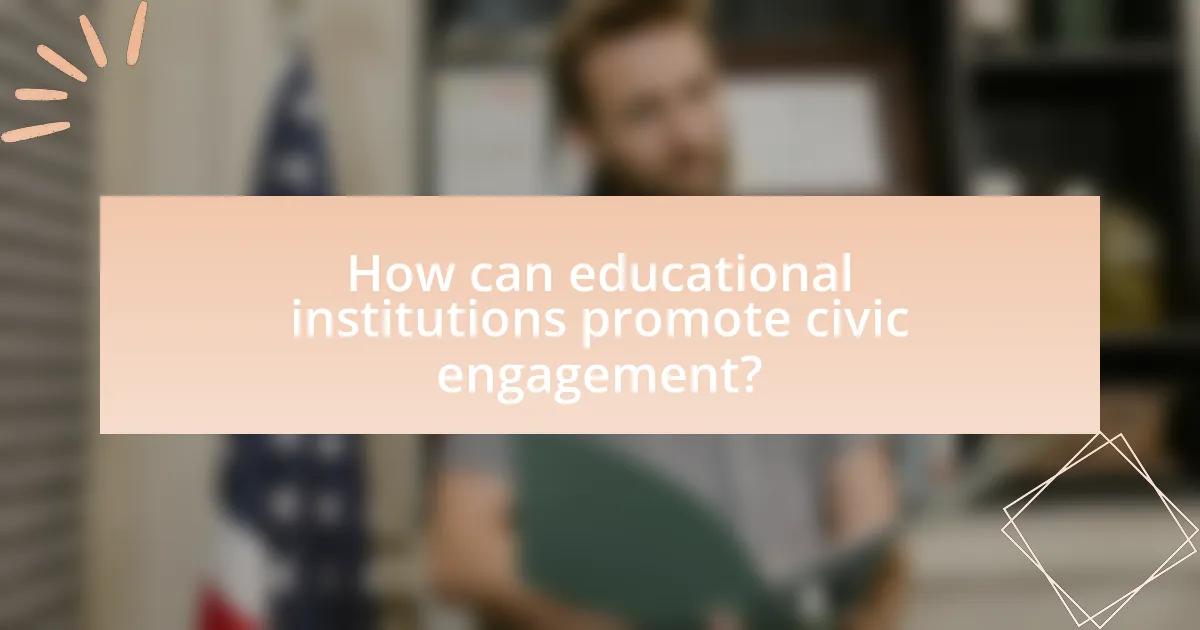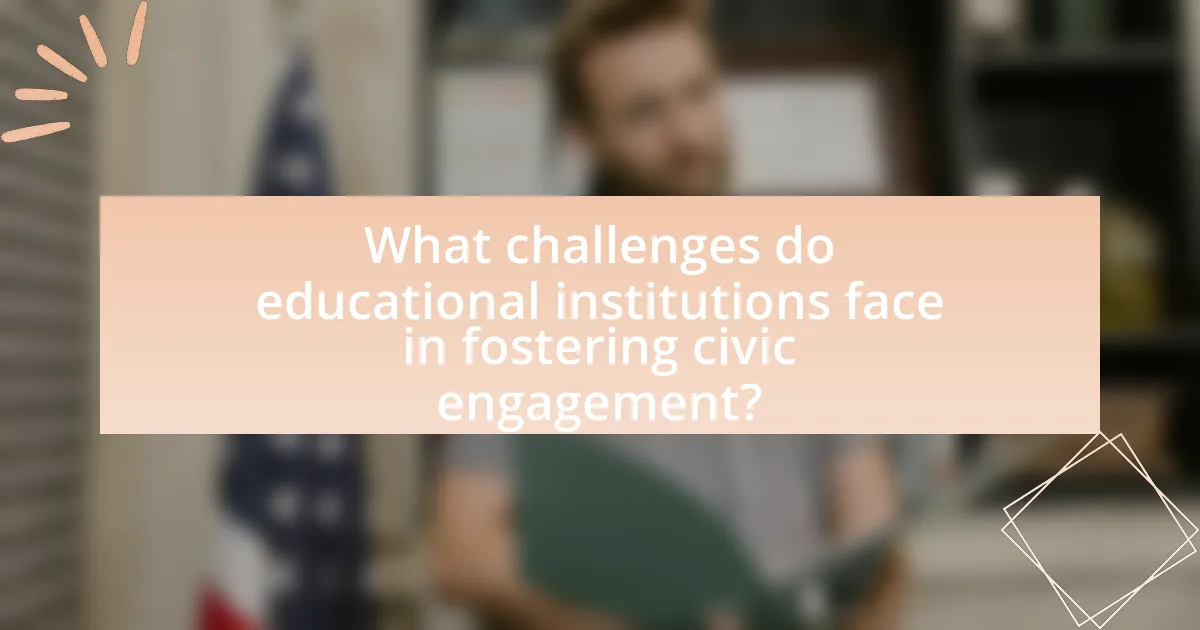The article examines the critical role of education in fostering civic engagement among individuals. It highlights how educational curricula that emphasize civic knowledge, critical thinking, and social responsibility encourage active participation in democratic processes, such as voting and community service. Key components of civic education, including understanding democratic principles and awareness of civic rights, are discussed, along with the impact of experiential learning methods like service-learning on student engagement. The article also addresses the challenges educational institutions face in promoting civic engagement, the influence of socioeconomic factors, and the potential of technology to enhance civic participation.

What is the Role of Education in Fostering Civic Engagement?
Education plays a crucial role in fostering civic engagement by equipping individuals with the knowledge, skills, and values necessary to participate actively in democratic processes. Through curricula that emphasize critical thinking, social responsibility, and an understanding of civic rights and duties, education encourages students to engage in community service, advocacy, and informed voting. Research indicates that students who receive civic education are more likely to vote and participate in civic activities; for instance, a study by the Center for Information and Research on Civic Learning and Engagement found that high school students who took a civics course were significantly more likely to vote in subsequent elections. Thus, education not only informs individuals about their civic responsibilities but also inspires them to take action within their communities.
How does education influence civic knowledge and awareness?
Education significantly enhances civic knowledge and awareness by providing individuals with the necessary information and critical thinking skills to understand political systems and civic responsibilities. Research indicates that higher levels of education correlate with increased civic participation, as educated individuals are more likely to vote, engage in community service, and advocate for social issues. For instance, a study by the National Center for Education Statistics found that individuals with a bachelor’s degree are 20% more likely to vote compared to those with only a high school diploma. This demonstrates that education not only imparts knowledge about civic rights and duties but also fosters a sense of responsibility and engagement in democratic processes.
What are the key components of civic knowledge taught in educational settings?
The key components of civic knowledge taught in educational settings include understanding democratic principles, knowledge of government structures, awareness of civic rights and responsibilities, and engagement in community issues. Educational curricula often emphasize the importance of democratic values such as equality, justice, and participation, which are foundational to civic engagement. Additionally, students learn about the functions of local, state, and federal governments, which equips them with the knowledge necessary to navigate and participate in political processes. Awareness of civic rights and responsibilities, such as voting and community service, fosters a sense of duty and encourages active participation in civic life. Research indicates that students exposed to comprehensive civic education are more likely to engage in civic activities, demonstrating the effectiveness of these components in promoting civic engagement.
How does awareness of civic issues impact student engagement?
Awareness of civic issues significantly enhances student engagement by fostering a sense of responsibility and connection to their communities. When students are informed about civic matters, they are more likely to participate in discussions, volunteer for community service, and engage in political processes. Research conducted by the Center for Information and Research on Civic Learning and Engagement (CIRCLE) indicates that students who are educated about civic issues are 50% more likely to vote and participate in civic activities compared to those who are not. This correlation demonstrates that increased awareness leads to higher levels of active participation in civic life.
Why is civic engagement important for society?
Civic engagement is important for society because it fosters active participation in democratic processes, leading to more representative governance. When individuals engage in civic activities, such as voting, community service, or advocacy, they contribute to the shaping of policies that affect their lives and communities. Research indicates that higher levels of civic engagement correlate with improved community well-being and social cohesion, as seen in studies by the National Conference on Citizenship, which found that engaged citizens are more likely to report satisfaction with their communities and trust in government. This active participation not only empowers individuals but also strengthens the democratic fabric of society.
What are the benefits of an engaged citizenry?
An engaged citizenry enhances democratic governance and community well-being. Engaged citizens participate in civic activities, such as voting and community service, which leads to increased political accountability and responsiveness from elected officials. Research indicates that higher levels of civic engagement correlate with improved public policies and community outcomes, as seen in studies by the National Civic League, which found that engaged communities experience lower crime rates and better educational performance. Furthermore, engaged citizens foster social cohesion and trust, contributing to a more resilient society.
How does civic engagement contribute to democratic processes?
Civic engagement enhances democratic processes by fostering active participation and informed decision-making among citizens. When individuals engage in civic activities, such as voting, attending town hall meetings, or participating in community service, they contribute to a more representative and responsive government. Research indicates that higher levels of civic engagement correlate with increased voter turnout and greater public trust in government institutions. For instance, a study by the Pew Research Center found that communities with robust civic engagement initiatives saw a 20% increase in voter participation during elections. This active involvement not only empowers citizens but also ensures that diverse perspectives are considered in policy-making, ultimately strengthening the democratic framework.

How can educational institutions promote civic engagement?
Educational institutions can promote civic engagement by integrating service-learning programs into their curricula. Service-learning combines community service with academic instruction, allowing students to apply classroom knowledge to real-world challenges. Research indicates that students who participate in service-learning are more likely to develop civic skills and a sense of social responsibility. For instance, a study published in the Journal of Higher Education found that students involved in service-learning reported higher levels of civic engagement and community involvement compared to their peers who did not participate. By fostering partnerships with local organizations, educational institutions can create opportunities for students to engage in meaningful community projects, thereby enhancing their civic awareness and participation.
What teaching methods are effective in fostering civic engagement?
Experiential learning methods, such as service-learning and project-based learning, are effective in fostering civic engagement. These methods actively involve students in community service projects or real-world problem-solving, which enhances their understanding of civic responsibilities and social issues. Research by the National Service-Learning Clearinghouse indicates that students engaged in service-learning demonstrate increased civic knowledge, skills, and attitudes, leading to higher rates of civic participation. Additionally, discussions and debates on current events in the classroom encourage critical thinking and awareness of civic duties, further promoting engagement.
How do experiential learning opportunities enhance civic participation?
Experiential learning opportunities enhance civic participation by providing individuals with hands-on experiences that foster critical thinking and active engagement in community issues. These opportunities, such as service-learning projects and internships, allow participants to apply theoretical knowledge in real-world contexts, thereby deepening their understanding of civic responsibilities. Research indicates that students involved in service-learning are more likely to vote and engage in community service, as evidenced by a study published in the Journal of Higher Education Outreach and Engagement, which found that 80% of participants reported increased civic involvement after such experiences. This direct engagement not only cultivates a sense of agency but also strengthens community ties, ultimately leading to a more informed and active citizenry.
What role do discussions and debates play in civic education?
Discussions and debates are essential components of civic education as they promote critical thinking and enhance understanding of democratic principles. Engaging in discussions allows individuals to explore diverse perspectives, fostering an environment where civic knowledge can be shared and debated. Research indicates that students who participate in structured debates demonstrate improved civic skills, such as argumentation and public speaking, which are crucial for active participation in democratic processes. For instance, a study by the Center for Information and Research on Civic Learning and Engagement found that students involved in debate programs are more likely to vote and engage in community service, highlighting the direct impact of these activities on civic engagement.
What programs or initiatives support civic engagement in education?
Programs and initiatives that support civic engagement in education include the National Youth Leadership Council, which promotes service-learning as a means to develop civic skills, and the Close Up Foundation, which offers experiential learning programs focused on government and civic participation. Additionally, the Civic Engagement Research Group at the University of Massachusetts Amherst conducts research on effective practices in civic education, providing evidence-based strategies for schools. These initiatives are designed to enhance students’ understanding of civic responsibilities and encourage active participation in their communities.
How do service-learning programs integrate civic engagement into curricula?
Service-learning programs integrate civic engagement into curricula by combining academic instruction with community service, allowing students to apply classroom knowledge to real-world issues. This experiential learning approach fosters critical thinking and social responsibility, as students engage in projects that address community needs while reflecting on their experiences. Research indicates that students involved in service-learning demonstrate increased civic knowledge and a greater likelihood of participating in civic activities, as evidenced by a study published in the Journal of Higher Education Outreach and Engagement, which found that 85% of participants reported enhanced civic engagement skills.
What partnerships can schools form to enhance civic education?
Schools can form partnerships with local government agencies, non-profit organizations, and community groups to enhance civic education. Collaborating with local government agencies allows schools to provide students with firsthand experiences in civic processes, such as attending town hall meetings or participating in community service projects. Partnering with non-profit organizations can offer resources and programs focused on civic engagement, such as voter registration drives or educational workshops on civic rights and responsibilities. Additionally, community groups can facilitate mentorship opportunities and real-world projects that encourage students to engage with their local communities, fostering a deeper understanding of civic responsibilities. These partnerships have been shown to increase student participation in civic activities, as evidenced by studies indicating that students involved in community-based civic education programs are more likely to vote and engage in civic discussions.

What challenges do educational institutions face in fostering civic engagement?
Educational institutions face significant challenges in fostering civic engagement, primarily due to limited resources, varying levels of institutional commitment, and a lack of effective curricula. Limited funding restricts the ability to implement programs that promote civic participation, while inconsistent support from administration can hinder the development of a culture of engagement. Additionally, many educational institutions lack comprehensive curricula that integrate civic education, resulting in students being unprepared to participate actively in their communities. Research indicates that only 25% of high school students report receiving adequate civic education, highlighting the gap in preparation for civic involvement.
How do socioeconomic factors impact civic engagement in education?
Socioeconomic factors significantly impact civic engagement in education by influencing access to resources, opportunities, and social networks. Individuals from higher socioeconomic backgrounds often have greater access to quality education, extracurricular activities, and community resources, which fosters higher levels of civic participation. For instance, research by the Pew Research Center indicates that individuals with higher education levels, often correlated with higher socioeconomic status, are more likely to vote and engage in community service. Conversely, those from lower socioeconomic backgrounds may face barriers such as limited access to information, fewer role models, and reduced opportunities for involvement, leading to lower rates of civic engagement. This disparity highlights the critical role that socioeconomic status plays in shaping educational experiences and civic participation outcomes.
What barriers exist for underrepresented groups in civic participation?
Underrepresented groups face several barriers in civic participation, including socioeconomic status, lack of access to education, and systemic discrimination. Socioeconomic status often limits access to resources necessary for participation, such as transportation and time off work. Lack of access to education can hinder understanding of civic processes and rights, as studies show that higher educational attainment correlates with increased civic engagement. Systemic discrimination, including racial and ethnic biases, can discourage participation by creating an environment where these groups feel marginalized or unwelcome. According to the U.S. Census Bureau, voter turnout among minority groups is consistently lower than that of white voters, highlighting the impact of these barriers on civic engagement.
How can schools address these challenges effectively?
Schools can address challenges in fostering civic engagement effectively by implementing comprehensive curricula that emphasize critical thinking, community service, and active participation in democratic processes. Research indicates that programs integrating service learning with academic content significantly enhance students’ civic knowledge and engagement levels. For instance, a study by the Center for Information and Research on Civic Learning and Engagement found that students involved in service learning are more likely to vote and participate in community activities. Additionally, schools can create partnerships with local organizations to provide students with real-world civic experiences, further reinforcing the importance of civic responsibility and community involvement.
What role does technology play in enhancing civic engagement through education?
Technology significantly enhances civic engagement through education by providing accessible platforms for information sharing and participation. Digital tools such as social media, online forums, and educational apps facilitate communication between educators, students, and the community, fostering a culture of active participation. For instance, a study by the Pew Research Center found that 70% of young people engage in civic activities online, demonstrating the effectiveness of technology in mobilizing youth for civic causes. Additionally, technology enables interactive learning experiences, such as simulations and virtual town halls, which help students understand civic processes and develop critical thinking skills. These tools not only inform but also empower individuals to take action in their communities, thereby strengthening democratic participation.
How can digital platforms facilitate civic discussions among students?
Digital platforms can facilitate civic discussions among students by providing accessible forums for dialogue and collaboration. These platforms, such as social media, discussion boards, and educational apps, enable students to share diverse perspectives, engage in debates, and collaborate on civic projects. Research indicates that online discussions can enhance critical thinking and civic knowledge, as students are exposed to a variety of viewpoints and resources. For instance, a study published in the Journal of Educational Psychology found that students who participated in online civic discussions demonstrated improved civic engagement and understanding of democratic processes.
What are the risks and benefits of using technology in civic education?
The use of technology in civic education presents both significant benefits and notable risks. Benefits include enhanced accessibility to information, allowing a broader audience to engage with civic content, as evidenced by the rise of online platforms that facilitate discussions and learning about civic responsibilities. Additionally, technology can foster interactive learning experiences, such as simulations and gamified content, which have been shown to increase student engagement and understanding of civic processes.
Conversely, risks associated with technology in civic education include the potential for misinformation to spread rapidly, undermining informed civic participation. Studies indicate that social media platforms can amplify false narratives, which may mislead users about civic issues. Furthermore, there is a concern regarding the digital divide, where unequal access to technology can exacerbate existing disparities in civic knowledge and engagement among different socioeconomic groups.
What are best practices for educators to foster civic engagement?
Educators can foster civic engagement by integrating service-learning projects into the curriculum. Service-learning combines community service with academic instruction, allowing students to apply classroom knowledge to real-world issues. Research indicates that students who participate in service-learning demonstrate increased civic knowledge and engagement, as evidenced by a study published in the “Journal of Higher Education Outreach and Engagement,” which found that 85% of participants reported a greater understanding of civic responsibilities. Additionally, educators should encourage discussions about current events and social issues, promoting critical thinking and debate skills. This approach not only enhances students’ awareness of civic matters but also prepares them to participate actively in democratic processes.
How can teachers create a classroom environment that encourages civic participation?
Teachers can create a classroom environment that encourages civic participation by integrating active learning strategies that promote critical thinking and discussion about civic issues. For example, implementing project-based learning allows students to engage with real-world problems, fostering a sense of responsibility and agency. Research indicates that classrooms that utilize collaborative learning techniques, such as group discussions and debates, significantly enhance students’ understanding of civic responsibilities and their willingness to participate in civic activities. According to a study published in the Journal of Educational Psychology, students who engage in civic-related projects demonstrate higher levels of civic knowledge and engagement compared to those in traditional lecture-based settings.
What strategies can educators use to engage students in local community issues?
Educators can engage students in local community issues by implementing project-based learning, which allows students to work on real-world problems within their communities. This approach fosters critical thinking and collaboration, as students research local issues, develop solutions, and present their findings to community stakeholders. Research by the Buck Institute for Education shows that project-based learning enhances student engagement and retention of knowledge, making it an effective strategy for connecting classroom learning with community involvement. Additionally, educators can facilitate partnerships with local organizations, enabling students to participate in service-learning projects that address specific community needs, further solidifying their connection to local issues.